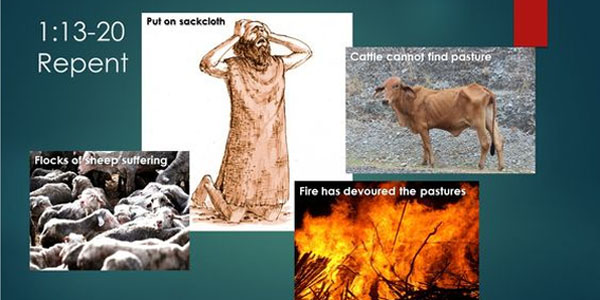Joel 1:13-20 (CLICK HERE FOR BIBLE VERSES)

Hi GAMErs!
Today’s passage is Joel 1:13-20. Let’s go!
Joel 1:13-14 (NIV)
13 Put on sackcloth, O priests, and mourn; wail, you who minister before the altar. Come, spend the night in sackcloth, you who minister before my God; for the grain offerings and drink offerings are withheld from the house of your God.
14 Declare a holy fast; call a sacred assembly. Summon the elders and all who live in the land to the house of the LORD your God, and cry out to the LORD.
On verses 13-14: Joel’s nation was facing desperate times. A famine meant that offerings were withheld from the house of God (v13). In the midst of these desperate times, Joel calls the priests not only to mourn and wail (v13) but also to declare a fast and call a sacred assembly so that the people could come together in God’s presence with prayer and fasting (v14).
What can we learn from this? When you’re going through desperate and painful times, don’t just cry, but “cry out to the LORD” (v14). Don’t just weep on your own, but come together with God’s people and call out to God (v19). Treat the crisis as an opportunity to fast and draw near to God and to look to Him for help and perspective.
Joel 1:15-20 (NIV)
15 Alas for that day! For the day of the LORD is near; it will come like destruction from the Almighty.
16 Has not the food been cut off before our very eyes– joy and gladness from the house of our God?
17 The seeds are shriveled beneath the clods. The storehouses are in ruins, the granaries have been broken down, for the grain has dried up.
18 How the cattle moan! The herds mill about because they have no pasture; even the flocks of sheep are suffering.
19 To you, O LORD, I call, for fire has devoured the open pastures and flames have burned up all the trees of the field.
20 Even the wild animals pant for you; the streams of water have dried up and fire has devoured the open pastures.
On verses 15-20: Joel sees the devastation that has happened in his land – the lack of food and the absence of joy (v16), the grain fields and storehouses in poor condition (v17), the cattle and sheep suffering (v18), open pastures and trees ravaged (v19), wild animals panting and streams drying up (v20). Joel sees it all as a sign that “the day of the LORD is near” (v15).
What is the day of the LORD? For Joel, the day of the LORD is a time when God will judge the nations (Joel 3:1-15). Joel calls this day of the LORD “a day of darkness and gloom, a day of clouds and darkness” (Joel 2:2), a “great and dreadful” day (Joel 2:11, 31). At the same time, according to Joel, on the day of the LORD God will protect and set apart His people who trust in him (Joel 3:16-21; 2:32). In the New Testament, apostles like Paul and Peter would expand on this idea of the day of the LORD as the day when Jesus returns.
So if Joel wrote over 2,000 years ago that the day of the LORD is near, when exactly will this day of the LORD take place? That’s not for us to know. Rather, our job is be ready by trusting in the One who promises to keep us safe when that day of the LORD does come. His name is Jesus.
Father, thank You that in my desperate times, I can run to You, not away from You. Just as Joel encouraged his people to draw near to God through prayer and fasting, may I make the most of the opportunity to draw near to You with my church family. I believe that as I seek You honestly and humbly, You will have more room to work in my life, and that You will breathe new life in me. In Jesus’ name, AMEN!
Copyright © 2021 Justin Lim. All rights reserved.

